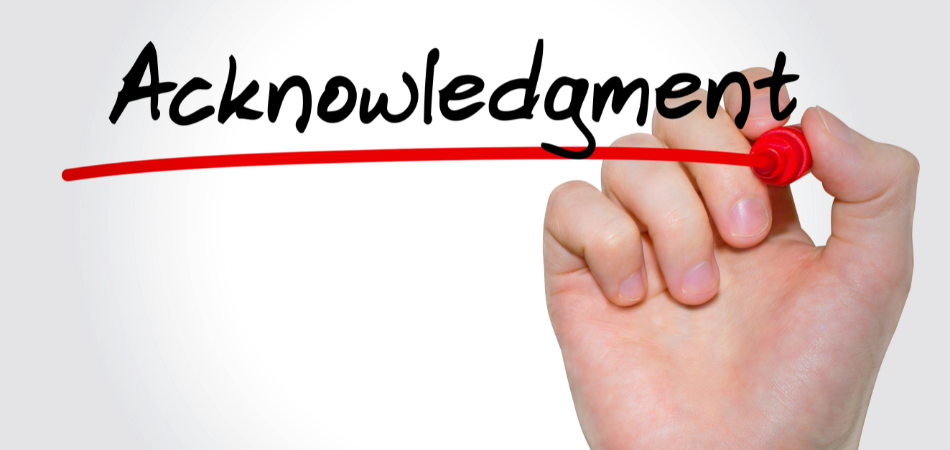When crafting a conference paper, many elements must be taken into consideration. Each component plays a critical role in the final product, from the research and analysis to the writing and formatting.
However, one aspect that is often overlooked or downplayed is the acknowledgement section. Now you may think: Do acknowledgments in conference paper count?
Yes, acknowledgements in conference papers typically count towards the overall length of the paper, including the word or page limit set by the conference organizers. To read more about that, keep reading the entire content.
Key Takeaways
- Acknowledgements are a common practice in academic publishing and serve to express gratitude to individuals or institutions that have contributed to the research process.
- Effective acknowledgement writing involves being specific about the contributions of each person or organization and following the norms and expectations of the academic community and field of study.
- Acknowledgement culture may differ among academic communities worldwide, and the perceived value of acknowledgements may vary based on the field of study and the cultural norms of the academic community.
- While acknowledgements are not mandatory, they can help strengthen the publication and ensure the research is well-received, especially in the humanities and social sciences.
The Purpose of Acknowledgements in Conference Papers
The purpose of acknowledgements in conference papers is to recognise individuals or organizations that have provided support, resources, or assistance during the research process in an academic gathering like an international educational conference. This is an important aspect of acknowledgement etiquette in academic writing.
It is customary to acknowledge funding sources, such as grants or fellowships, as well as those who provided technical assistance, data, or equipment. These acknowledgements serve as a way of thanking those who have helped make the research possible and demonstrating scientific inquiry’s collaborative nature.

Acknowledgements can also serve other purposes, such as highlighting the contributions of colleagues or collaborators who helped shape the research project. Additionally, acknowledging those who provided feedback on the paper can help strengthen the publication and ensure that the research is well-received by the scientific community. However, while acknowledgements are common in good conference papers, their perceived value can vary among different audiences.
The Perceived Value of Acknowledgements
One possible perception of the worth of expressing gratitude in academic publications is its potential impact on readers‘ perceptions of the author’s professionalism and credibility.
Acknowledgements may be seen as a way for authors to demonstrate their awareness of the collaborative nature of research and their appreciation of those who helped them along the way.
However, the perceived value of acknowledgements is not uniform across all academic disciplines and cultures. In some fields, such as the humanities and social sciences, acknowledgements are commonly included in conference papers and journal articles as a way of acknowledging the contributions of others.
In other fields, such as the natural sciences, there may be a different acknowledgement etiquette, where acknowledgements are less common and may be considered unnecessary.
Additionally, acknowledgement culture may differ among academic communities in different parts of the world. Therefore, the perceived value of acknowledgements may vary based on the field of study and the cultural norms of the academic community.
With this in mind, it is important for authors to consider the potential impact of acknowledgements on their audience and to use best practices for writing effective acknowledgements.
Best Practices for Writing Effective Acknowledgements
Effective acknowledgement writing involves considering the acknowledgement etiquette, norms, and expectations of the author’s academic community and field of study. Express gratitude to individuals who have contributed to the research and paper’s success.
However, acknowledgements should be concise, and specific and avoid unnecessary personal details. Authors should avoid using acknowledgements as an opportunity to thank everyone they know or to provide excessive details about the personal relationship with the individuals being thanked.
Instead, they should focus on acknowledging individuals who have contributed significantly to the research, such as providing funding, data, or technical support. When writing acknowledgements, authors should strive to be authentic, sincere, and professional. The tone should be grateful but not overly emotional or effusive. It is also essential to use appropriate language and avoid colloquialisms or slang.
In summary, effective acknowledgement writing involves following the norms and expectations of the academic community and field of study, expressing gratitude, being concise and specific, and avoiding unnecessary personal details. With these best practices, authors can craft meaningful, professional, and well-received acknowledgements. Moving forward, we will explore examples of effective acknowledgements that demonstrate these best practices.
Examples of Effective Acknowledgements
Several studies have shown that acknowledgement writing is an important aspect of paper publishing. In this subtopic, we will examine examples of acknowledgements that follow best practices in the field.
Acknowledgements express gratitude to individuals or institutions for contributing to the research process. However, acknowledgement etiquette can be tricky to understand, as certain norms and expectations must be followed.
One effective way to approach acknowledgements is to be specific about the contributions of each person or organization. This can be achieved using a table to list individuals and their specific roles in the research process.
For example, in a study on the effects of climate change on bird populations, the acknowledgements could include a table that lists the names of individuals who contributed to data collection, statistical analysis, and manuscript preparation. The authors value each person’s role and expertise by acknowledging specific contributions.
Additionally, consider the tone of acknowledgements. While expressing gratitude is important, acknowledgements should be written professionally and respectfully. By following these best practices, authors can effectively recognise the contributions of others while maintaining the scholarly integrity of their work.
Conclusion
The utilization of acknowledgements in conference papers serves a vital purpose. These sections allow the author to express gratitude or appreciation to those who have supported them throughout their research journey.
Acknowledgements can also offer insight into the author’s connections and affiliations, providing readers with a more holistic understanding of the research.
While some may perceive acknowledgements as insignificant, they hold immense value in academic writing. To write effective acknowledgements, one must consider best practices, such as being concise and specific and avoiding overly personal or informal language. By following these guidelines, authors can create professional and heartfelt acknowledgements.
Overall, acknowledgements are essential to conference papers and should not be overlooked. They offer an opportunity for authors to express appreciation, establish credibility, and create a more comprehensive understanding of their research.







